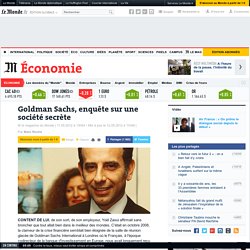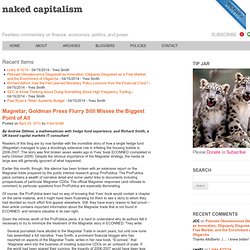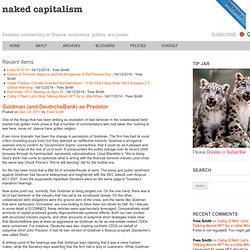

Goldman Sachs, enquête sur une société secrète. M le magazine du Monde | • Mis à jour le | Par Marc Roche CONTENT DE LUI, de son sort, de son employeur, Yoël Zaoui affirmait sans broncher que tout allait bien dans le meilleur des mondes.

C'était en octobre 2008, la clameur de la crise financière semblait bien éloignée de la salle de réunion glacée de Goldman Sachs International à Londres où le Français, à l'époque codirecteur de la banque d'investissement en Europe, nous avait longuement reçu dans le cadre d'une enquête du Monde sur la banque la plus puissante de la planète. Trois ans et demi plus tard, le petit prince de cette finance impitoyable est tombé de son piédestal. Après vingt-quatre ans de bons et loyaux services à Goldman Sachs, celui qui avait obtenu le statut d'associé en 1998 avant d'être désigné au saint des saints de la banque d'affaires - le management committee (comité de gestion) – a démissionné début avril, à 51 ans.
L'histoire – et celle des entreprises n'y échappe pas – a souvent de mordantes ironies. Why I Am Leaving Goldman Sachs.
Goldman Sachs, the crisis, the bonuses. Government Sachs. High frequency trading : the new cash cow. Goldman in Greece. Goldman & the SEC. Readings. Others (corporate culture, CEO...) Goldmansachs. GS. Goldman Sachs. Goldman Sachs. Magnetar, Goldman Press Flurry Still Misses the Biggest Point of. By Andrew Dittmer, a mathematician with hedge fund experience, and Richard Smith, a UK based capital markets IT consultant Readers of this blog are by now familiar with the incredible story of how a single hedge fund (Magnetar) managed to play a shockingly extensive role in inflating the housing bubble in 2006-2007.

The story was first broken seven weeks ago in Yves’ book ECONNED (completed in early October 2009). Despite the obvious importance of the Magnetar strategy, the media at large was still generally ignorant of what happened. Earlier this month, though, this silence has been broken with an extensive report on the Magnetar trade prepared by the public interest research group ProPublica. The ProPublica piece contains a wealth of narrative detail and some useful links to documents including prospectuses of particular Magnetar CDOs. Several journalists have alluded to the Magnetar Trade in recent years, but until now none has assembled a full narrative.
Goldman (and DeutscheBank) as Predator. One of the things that has been striking as revelation of bad behavior in the collateralized debt market has gotten more press is that a number of commentators who had taken the “nothing to see here, move on” stance have gotten religion.

Even more dramatic has been the change in perception of Goldman. The firm has had its vocal critics (including yours truly) but they seemed an ineffective minority. Goldman’s arrogance seemed only to confirm its “Government Sachs” connections, that it could do as it pleased and thumb its nose at the rest of us to boot. It compounded the public outrage over its record 2009 bonuses through its hamhanded, narcissistic rationalizations.
Lloyd Blankfein’s “We’re doing God’s work” has come to epitomize what is wrong with the financial services industry post-crisis the same way Chuck Prince’s “We’re still dancing” did for the bubble era. So the has been more that a little bit of schadenfreude at work.